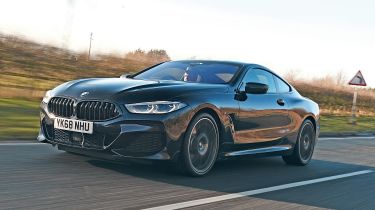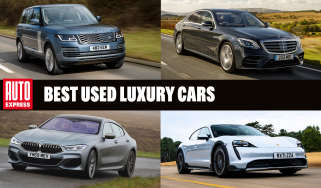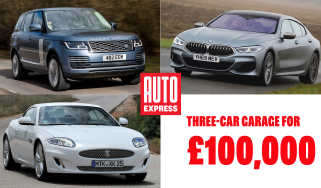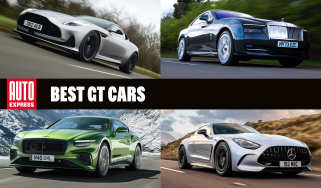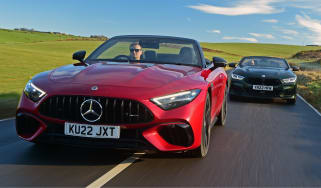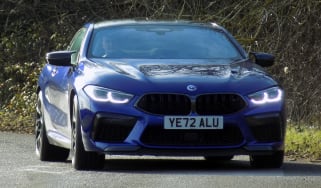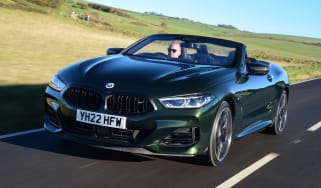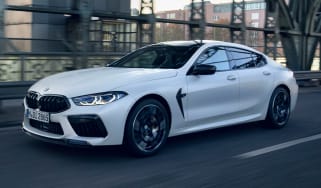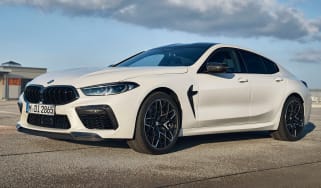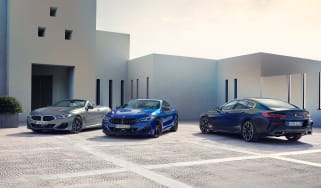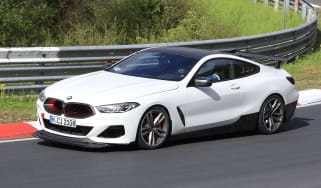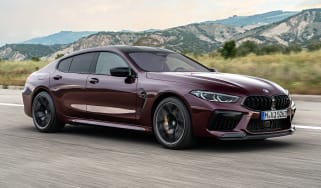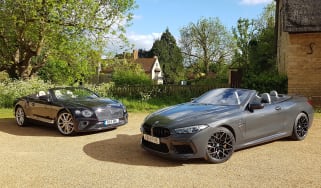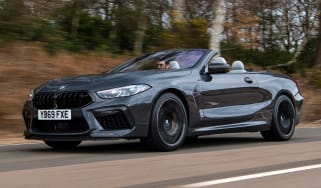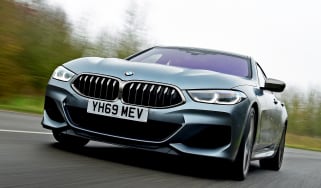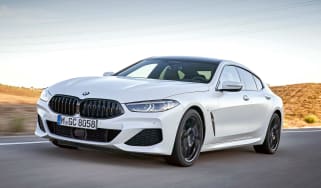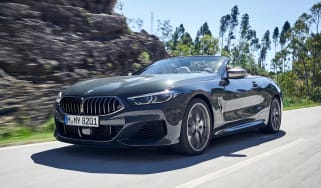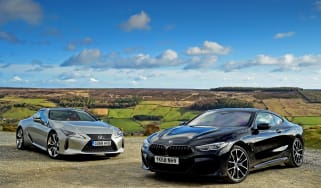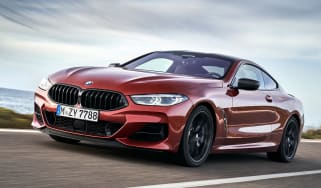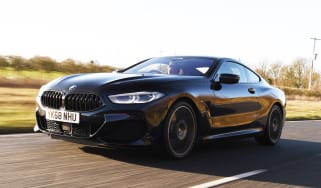BMW 8 Series review
Muscle car performance and proportions give BMW’s 8 Series old-school appeal, but it’s packed with the latest technology

The range-topper within BMW’s sports car lineup, the 8 Series aims to mix luxury grand touring with an engaging driving experience. The design is more traditional than some of BMW’s more recent unveilings but still has plenty of presence on the road thanks to its sheer size. The cabin’s fit and finish, along with the technology on board means the 8 Series impresses inside and out.
There’s 4x4 drive from the devastatingly quick V8 M850i or M8 Competition models, while a big boot makes the coupe a genuinely practical grand tourer, if you accept that the confined rear seats are only for occasional use. Otherwise the four-door Gran Coupe variant effectively addresses any accommodation problems.
About the BMW 8 Series
Almost 20 years after the first 8 Series went off sale (the wedge-shaped one with the pop-up headlights), the second generation model launched in 2018. Although the original was coupe-only, to replace the 6 Series’ range of bodystyles the current BMW 8 Series is offered as a two-door Coupe, a four-door Gran Coupe version with an extended wheelbase and a Convertible that sits at the top of the range. BMW introduced a light facelift for the range in early 2022 incorporating subtle styling tweaks, along with extra onboard technology and equipment (pictures in this review are pre-facelift model).
Used - available now

2024 BMW
iX3
14,738 milesAutomaticElectric
Cash £29,490
2015 Land Rover
Range Rover Evoque
88,100 milesAutomaticDiesel2.2L
Cash £10,000
2019 Mitsubishi
Eclipse Cross
27,000 milesManualPetrol1.5L
Cash £13,000
2022 MG
MG3
21,600 milesManualPetrol1.5L
Cash £8,000Don’t let the name fool you, in terms of powertrain the 8 Series shares nothing with the now defunct i8 hybrid when it went on sale. Those looking for frugality should check out the 316bhp 3.0-litre diesel 840d xDrive - although you’ll have to look at used models as it’s no longer on sale. This leaves a petrol-only lineup: the 328bhp 840i, the 523bhp M850i xDrive, with a 4.4-litre twin-turbo and the M Competition - which uses the same V8 engine tuned to 616bhp.
Once you’ve chosen a body style and engine, BMW makes life relatively simple because there are no trim grade options beyond those imposed by your engine choice. The entry-level 840i only comes in M Sport guise, while you’ll find the M850i under “M Models” if you delve into the configurator.
Naturally equipment levels are lavish even on M Sport cars, but BMW will try to upsell you into a range of expensive add-on packages. These include the £1,500 Visibility Pack for laser headlamp upgrades, the M Sport Pro pack for 20-inch alloy wheels and dark chrome exterior finishes, the £3,000 Comfort Plus Pack for features including heated armrests, ventilated seats and electric window blinds, and the £6,000 Technology Plus Pack which includes a 1,400 Watt Bowers & Wilkins sound system, a full package of active driver assistance features, on-board video recording and Parking Assistant Plus. The £19,000 Ultimate Pack includes all of the above, plus additional features such as a TV receiver.
While the BMW 8 Series offers a distinct blend of comfort and sportiness that sets it apart, it enters a market that’s not short of rivals when it comes to expensive GT models. With list prices starting from around £77,000 for the cheapest Gran Coupe four-door to almost £143,000 for the M8 Competition convertible, the roster of potential competitors includes the sportiest of rivals such as the Porsche 911, along with more relaxed offerings like the Lexus LC.
The Gran Coupe goes head-to-head with the Audi A7 Sportback and Mercedes CLS. All 8 Series get an eight-speed automatic gearbox and all bar the 840i feature xDrive four-wheel drive.
Inside BMW’s own range there’s not much that comes close. Buyers looking for ultimate luxury might consider the larger BMW X7 SUV, while those wanting sporty thrills will arguably be better satisfied behind the wheel of a BMW M4 or M5.
Engines, performance and drive
The BMW 8 Series in Gran Coupe form occupies a similar footprint to the Range Rover Sport, so it’s fair to say it’s a big beast, and as a result doesn't possess the agility of smaller more focused rivals such as the Porsche 911. It can’t match the Lexus LC or Aston Martin Vantage for steering feel or responsiveness, either. Despite its size, it’s surprisingly easy to place on a British B-road.
There’s certainly no shortage of grip from the BMW’s meaty tyres, however, while the Sport and Sport Plus driving modes stiffen up the dampers, bringing a bit more edginess into steering and throttle responses, while also feeding fake engine noises into the cabin for added drama. We suspect most owners will settle for Comfort mode which gives a softer ride, but doesn’t really make the 8 Series any less capable through corners.
In particular, the BMW impresses with only nominal body lean, and the carefully balanced active 4WD system always gives the feel of a rear-wheel-drive car, while delivering spectacular grip under acceleration. The M50i variant has four-wheel steering for even greater agility, but it never masks the vehicle’s bulk.
The ride quality is generally excellent, although some larger imperfections can introduce a bit of crashiness. The eight-speed automatic makes seamless changes when left to its own devices, but shows lightning reactions if you choose to override the computer using steering wheel paddles. Opting for the drop-top 8 Series adds more weight, but doesn't dilute the driving experience too much, and it still feels remarkably composed for such a large car and even with a canvas roof, the refinement doesn’t suffer too much.
The M8 Competition models offer remarkable grip and turn-in considering they all weigh around two tonnes. Precise and responsive steering does a great job of hiding that mass, at low speeds at least. There’s not much communication from the front wheels, though, and with such high limits, any spirited driving is probably best left for the track. You can also select ‘4WD Sport’ and ‘2WD’ mode, which in turn switches off the stability control system. In two-wheel drive mode, the M8 will happily lose traction at the rear but requires some effort to wrestle the mass back into line. There’s also an active exhaust system, although for a true M car we’d like the louder setting to be a bit more vocal.
0-62mph acceleration and top speed
The 3.0-litre straight-six mild-hybrid diesel has been discontinued, but some buyers may still be interested in the oil-burner as a used buy. Badged 840d, it offered 335bhp and a hefty 680Nm of torque. The diesel may be something of a hard sell in today's electrified age, but there’s little doubt that its performance characteristics suit the big BMW well. It delivers more range than the petrol models and suits the 8 Series’ grand touring abilities. It’s also a unit that feels unstressed and unstrained, and while it has a lazy, easy-driving feel, a 0-62mph time of 4.8 seconds and 155mph top speed are pretty muscular.
The 840i petrol has a 3.0-litre turbocharged straight six, producing 328bhp and does without xDrive four-wheel drive. 0-62mph takes 5.2s in the Coupe, with the Grand Coupe and Convertible a few tenths slower.
The mighty M850i is a different kettle of fish altogether, with a roaring twin-turbo 4.4 V8 making 523bhp and delivering 0-62mph in 3.9 seconds. A similar, more powerful version of this engine is offered in the M8 Competition, producing 616bhp, 750Nm of torque and a 0-62mph time of 3.2 seconds (or 3.3 in the Convertible).
MPG, CO2 and running costs
Tiresome though the news may be, if you’re forced to factor running costs into your new car purchase, it’s highly unlikely the M850i is the right model for you. BMW says it will cover up to 26.9mpg on the (WLTP test) combined cycle and we easily reached this number during a motorway test drive, but if you tap into its phenomenal performance too often you’ll see the MPG figure will drop like a stone.
Equally, the 239g/km of CO2 emitted under test conditions is unlikely to match real world use, but at least that won’t cost anything more from a financial perspective. The car is in the maximum Benefit-in-Kind bracket, too, so you’ll be whacked by the tax man if you run an M850i on the company, although it’s a similar story for any high-performance company car – unless it’s a hybrid or electric vehicle.
The 840i petrol model manages up to 33.6mpg with CO2 emissions of 190g/km, while if you want to track down a used 840d diesel version then you'll benefit from fuel economy of around 44mpg.
Insurance groups
The Association of British Insurers has assessed both the new 8 Series models as insurance group 50, which means sky-high premiums for anyone not on a multi-car company-type policy, or on very good terms with their broker. It’s no surprise though, as all high performance and luxury cars are expensive to cover.
Depreciation
Initial residual values for the 8 Series were strong, although this has waned slightly over time, with expert data suggesting the M models will only hold onto an average value of around 45 per cent after a three-year/36,000-mile ownership period. The 840i fares a little better on 51 per cent.
Buyers should be wary of ticking the expensive Ultimate Pack option. It costs around £15,000 and, although it brings many extra features, it does nothing for long-term values.
To get an accurate valuation on a specific model check out our free car valuation tool...
Interior, design and technology
It’s fair to say there’s not much revolutionary about the 8 Series concept. It’s a brutish two-door coupe with a long nose, swooping roofline and powerful haunches – characteristics which have been admired by performance car enthusiasts for well over half a century.
When it was launched we initially thought it looked quite brutish and perhaps a little fussy by BMW standards, but since then we’ve seen BMW’s iconic kidney grille grow and some controversial designs hit the road so the 8 Series has softened in comparison.
Whatever trim level you choose, the 8 Series still has plenty of presence on the road. 20-inch alloy wheels fill the arches, and the sense of the exotic is heightened by the standard LED lights or optional laser headlamps. The front grille is typical BMW with a broad double-kidney treatment and big air vents, while the side view is pure muscle car. 20-inch alloy wheels fill the arches, and the sense of the exotic is heightened by the standard LED lights or optional laser headlamps. The front grille is typical BMW with a broad double-kidney treatment and big air vents, while the side view is pure muscle car.
Under its skin the 8 Series uses BMW’s modular CLAR platform with Carbon Core tech that integrates carbon-fibre into the structure. Other features of the platform technology package include GPS-controlled shifts for the auto transmission, and an advanced start-stop system using cameras as well as sensors.
Inside the 8 Series has a very contemporary feel, with plenty of buttons and touchpoints similar to a 5 Series. It’s beautifully finished though, with peerless craftsmanship and extremely high quality materials. It’s also packed with all the tech you’d expect of a luxury grand tourer.
If you want to personalise your 8 series, then BMW has a range of equipment packs to choose from. However, they are quite costly, so you'll need to be careful with your specification.
Sat-nav, stereo and infotainment
The core of the infotainment system is built around BMW’s 12.3-inch live cockpit digital dashboard and a 10.25-inch infotainment screen - which received an extensive update during the mid-life facelift of 2022. These are backed up by a standard-fit head-up display that projects vital info onto the windscreen. It’s all very highly specced and operates via BMW’s extremely slick latest iDrive system with its knurled control knob situated next to the transmission shifter. The only bugbear is the absence of Android Auto, but BMW included it from mid-2020 so watch out for that if you’re buying used. In all other respects it’s a masterclass in intuitive connectivity, although it might lack the wow factor compared to the new SL’s interior.
Practicality, comfort and boot space
If you can handle its overall size – the 8 Series is longer than some SUVs – this is a practical grand touring machine for two passengers. It’s nominally a four-seater, but humans with legs will not enjoy attempting to access the rear seats. Up front there are plenty of practical touches though, with twin cup-holders, a big glovebox and decently-sized door pockets. In spite of the car’s dimensions, practicality is helped by automatic parking assistance and all-round parking sensors and cameras.
The Grand Coupe model is almost as long as the executive 7 Series, and so offers more practicality and space for passengers to travel in comfort.
Dimensions and size
At 4,843mm long and 1,902mm wide, there’s no doubt the 8 Series takes up lots of space in the garage. From a size perspective it splits the difference between a Mercedes S-Class Coupe and the Aston Martin DB11. The Porsche 911 is noticeably smaller at 4,499mm x 1,808mm.
The extended wheelbase of the Grand Coupe means overall length comes in at over 5 metres, while it's also slightly taller.
Leg room, head room & passenger space
Nobody will complain about the passenger space in the front seats. You sit quite low and there’s a cosy feel thanks to the broad transmission tunnel, but there’s plenty of leg, elbow and headroom. The seats are supremely comfortable and supportive, and there’s plenty of adjustment in both the seats and the steering wheel.
The situation in the back couldn’t be more different. There’s virtually no legroom at all, even for children, and the car’s swoopy roofline means headroom is also severely compromised.
Rear access in the Gran Coupe is much improved over the standard two-door model. Two rear passengers can sit in complete comfort, while there is a middle seat for use on shorter journeys.
Boot space
The BMW 8 Series boot is definitely a good size, and with 420-litres of luggage space it outdoes some family hatchbacks. True, the shallow opening of the boot lid means it’s not the most practical space to access, but for the luxury coupe class, it’s not too bad. Choose the convertible and the capacity shrinks to 350 litres.
You even get 50:50 split-fold rear seats that are operated from inside the boot when you need more space. The boot lid is power assisted for hands-free operation, too.
The Gran Coupe offers an extra 20 litres of boot space, while the rear seats split in a 40:20:40 arrangement for increased practicality.
Reliability and safety
There’s no Euro NCAP independent crash test data for the BMW 8 Series, but as one of the German marque’s flagship models, it comes loaded with all the safety kit you can imagine. There aren’t many cars on the road that can boast a similar array of cameras and sensors intended to create a protective monitoring zone all around the car, and as you would expect there’s a full complement of passive and active safety technology, including intelligent active cruise control, lane-keeping assistance and autonomous emergency braking.
The head-up display should help to keep the driver focused, in spite of the potential distraction of the car’s impressive infotainment screens, it can also be toggled between M mode and the standard set up - placing more emphasis on the speedometer and rev counter. The basic structural engineering of the 8 Series, with its extremely rigid Carbon Core platform, stands you in good stead too if the worst should happen.
Customer satisfaction is improving with BMW finishing in 16th place (out of 29 brands) in the manufacturer ratings - up from 21st position the previous year, and ahead of Audi and Mercedes.
Warranty
The standard BMW warranty applies to the 8 Series, which means you get three-years cover with unlimited mileage – the same offer as Mercedes. You can also extend the warranty a year at a time for extra cash, as long as you’ve kept up to date with servicing and inspection requirements. It’s not a brilliant warranty package compared to some, but it’s better than Audi which limits you to 60,000 miles.
Servicing
The 8 Series has a service regime based on usage and constantly monitored oil quality, and while most can expect an annual service, some owners may find it stretches out to two years. Servicing costs won’t be as high as some exotic rivals, but the cost of wear items like brakes and tyres will be high.
